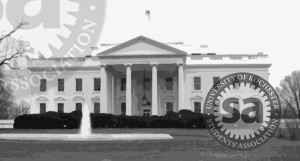
The SA has been talking with the White House's Office of Public Engagement in an effort to exchange ideas on a national scale. Cheryl Seligman, Presentation Editor.
Beginning in early October, the Students’ Association (SA) has been taking part in a nationwide initiative which connects student leaders directly with the White House. The SA, along with other colleges, has participated in three conference calls within the last month, speaking with leaders in the White House’s Office of Public Engagement.
Jon Carson, director of the Office of Public Engagement, Ronni Cho, the associate director of the Office of Public Engagement, and David Plouffe, senior advisor to President Obama, led the conversations between the students and the White House.
Two types of calls are presented in the initiative. A monthly campus engagement call occurs between student body presidents of various schools across the country, while issue-based calls focus on current events and problems that affect students in the U.S.
“It’s great to network with these other schools,” SA President Bradley Halpern said. “I’ve made connections that I otherwise would not have.”
The American Jobs Act, an initiative designed to create employment opportunities, has been placed on the hot seat during several of these conferences, in which students can hear more detailed information and question what is at stake.
“We’re key stakeholders in [the American Jobs Act]… We’re the ones needing jobs,” Halpern said.
The White House has spearheaded this project from the start, setting up the conference calls and creating this national organization of campus leaders. The SA plans to participate as long as the schools and government remain enthusiastic and involved.
Deputy Treasurer of the SA and junior Michael Dymond has been taking the lead in this project from within the SA.
“We want to develop better relations with the government and look at some of their insights in terms of leadership and government in general,” he said.
Dymond said that conference participants “talk about what college students can do to be active politically, to engage in leadership and to understand the issues at hand.”
Senior Katie Dean expressed her support of this national initiative. “There’s not enough connection between youth and federal government,” she said. “By bringing it directly to students, they will be more aware and involved.”
SA leaders hope that, through conversations with other campus leaders and the heightened understanding of national issues gained through this initiative, they will be able to promote an interest in campus leadership and the state of the country.
“I think it will give insight into how the real government works and functions as opposed to student governments,” junior Hanna Verhoeven said. “It might strengthen these student organizations and drive further interest in people interested in political science.”
The SA has participated in student leadership communications regionally through the Associated College Unions International (ACUI), an organization that Wilson Commons is partnered with that consists mainly of advisors and people working in student unions. While ACUI connects university members regionally, the SA’s initiative with the White House has allowed student government to be a part of something on a larger scale.
The conference connects the large state schools in California with small liberal arts schools in Nebraska and Oklahoma, all the way here to UR in the northeast.
“ACUI was great for benchmarking and was applicable in comparable circles,” said Halpern. “But sometimes when brainstorming, it’s good to talk with people with different backgrounds.”
The SA is currently formulating a communication strategy to get this initiative out to the UR community at large. They are working on what Halpern says is a “case-by-case basis,” engaging with groups as they see fit until the time comes to expand the initiative to reach the community at large.
Some students feel that communication between student leaders and the national government will not benefit UR unless they are already a part of campus leadership.
“It probably won’t get a lot of people involved because the students that are interested are probably already involved,” senior Travis Jackson said. “If they’re not, they probably won’t be interested.”
Sophomore Kristin Biedermen expressed a similar sentiment.
“The political science majors might be excited, but I’m not sure how broad interest will be,” she said.
These concerns have not been forgotten by the SA.
“Right now we’re in the infant stages,” Dymond said. “We will look to integrate the campus community into these types of initiatives and to reach out to everyone and to open up these types of opportunities. That’s part of the role of the SA — to provide opportunities to students.”
Associate Dean of Students Anne-Marie Algier looks forward to the opportunities available through this project.
“Exchanging ideas and thoughts with national leaders and students from all over the country should enrich our own campus leaders’ perspectives and also hopefully let the White House understand the concerns and opinions of the future leaders of our country,” she said.
Rosenberg is a member of
the class of 2012.


